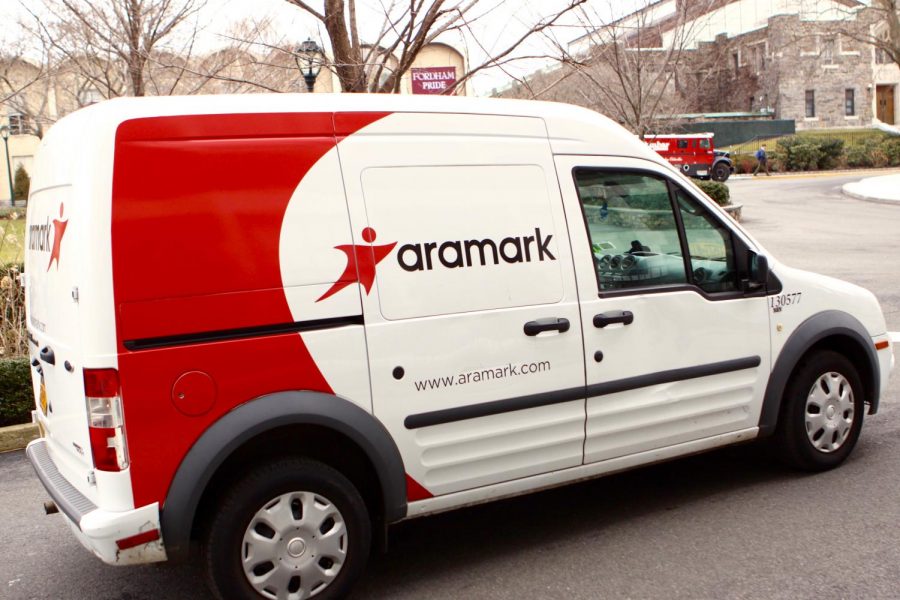Fordham Dining Provider Faces Controversy
By Amelia Antzoulatos
Early last semester, New York University’s (NYU) Incarceration to Education Coalition (IEC) staged a 155-hour occupation at the heart of campus in protest against Aramark: a company that works to provide NYU and Fordham University with dining services.
The Incarceration to Education Coalition (IEC), which fights discrimination against formerly incarcerated NYU applicants, cited a racially insensitive Black History Month meal served by Aramark in 2018, as well as the company’s ties to the prison system, as reasons for NYU to divest from Aramark and conduct its own in-house dining without a third party contractor.
The Ram reached out to leaders of IEC and the Aramark protest with no response.
Aramark has faced criticism from others, as well. In 2017, leaders of the Free Alabama Movement joined in protest against the food service provider after allegations of cold or “undernourished” meals and maggots. In addition, the company has received accusations of sexual harassment and drug trafficking.
In a PBS interview, Aramark spokesperson Karen Cutler said that these accusations are not uncommon at correctional facilities.
“Employee misconduct occurs regularly in most positions at every correctional facility in the country,” she said.
On Aramark’s website, the company also emphasizes that it does not manage or operate correctional facilities; it only creates menus. Often, the correctional facility will determine nutritional specifications, like calories, portions, religious meals.
According to Deming Yaun, ever since student groups first brought these issues to his attention three years ago, the topic comes up on a fairly regular basis.
Yaun, the Fordham’s Dining Contract Liaison at Fordham, works for the university and primarily makes sure both the external food service provider and the school adheres to the terms of a contract agreement.
He says universities like Fordham have almost no other companies to turn to for dining service operations because they need the worldwide experience and depth of resources providers like Aramark offer. These companies also present market research from Fordham’s campus and from around the world.
Regarding the protests at NYU, Yaun says Aramark was totally transparent as it was happening and made Fordham dining services fully aware of them.
Aramark shared basic information about the event because both schools reside in New York City, and not because it expected a similar reaction from students at Fordham. The decision was informative, rather than defensive, Yaun said.
He also said that since before he began working as Contract Liaison in 2013 and before Aramark became Fordham’s food provider three years ago, the university has tried to include student input and Multicultural Affairs in the planning of special events.
“We have all kinds of clubs representing all kinds of countries and cultures around the world, and we try to to stick to those as our special events,” he said. “We have it…as part of our culture to not do a cultural special event without involving people who have that experience.”
According to Frank LaGumina Jr., GSB ’20 and vice chair of the United Student Government (USG) Dining Committee, both Dining Services and Aramark have been receptive to concerns from USG and the general student body.
In an email interview, LaGumina explained that Fordham and Aramark are eager to gather student feedback online, and Aramark executives have accepted invitations to answer questions at weekly USG meetings.
He said that contact information for the managers of each dining location on campus have been posted on campus in order to create an open dialogue between students Dining Services.
“This is designed to encourage students to speak up immediately should there be any problems while dining on campus,” he said.
LaGumina said he does not believe Aramark’s relationship with the prison system is widely known by Fordham students, and he thinks students are primarily focused on the problems with the Fordham dining experience.
According to LaGumina, USG has not discussed the matter, and after speaking with committee members and the general student body, he said the issue is seldom brought to the committee’s attention.
“I believe USG tries to stay focused on what is going on at Fordham, and on being a voice for the student body,” he says.
Yaun also spoke to the relationship between food services providers and correctional facilities, based on his own experiences over the past 40 years working for companies like Sodexo, Compass and Aramark.
However, he clarified that he does not speak on behalf of Aramark.
“Aramark comes to any location with the same standards, particularly as it relates to food safety,” he says. “In every aspect, the intention to serve safe food to the resident population of the prisoners is exactly the same as [that at Fordham].”
He said the accusations brought against Aramark’s prison services are not a reflection of the company as a whole and that he cannot “imagine a company not having individual shortcomings on certain locations.”
Yaun says it is up to the people on site at that prison that have had negative experiences and the leadership from the company the prison hired to solve those problems.
He said dining services at the university ensures Fordham’s health standards and regulation are up-to-date.
“They look at standards far beyond a health inspection each and everyday,” he said. “They have people from [Aramark] dropping in unannounced and doing their own inspections.”
Both Fordham and Aramark hire outside consultants to conduct inspections and Yuan said prison facilities could elect to do the same.
“In a healthy contractor-client relationship, these things are monitored so frequently it just becomes part of everyday business,” Yaun said.
To send feedback about your dining experiences, you can visit YourDiningVoice.com.







































































































































































































